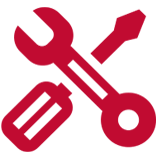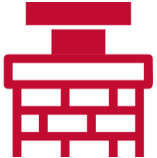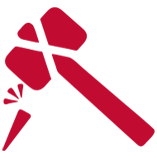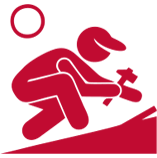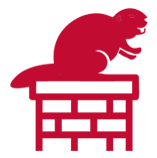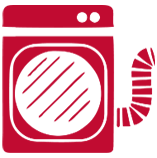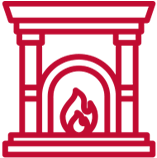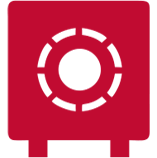A functional fireplace is more than just ornamental; it can also provide supplemental heat, helping you lower your winter energy bills.
What happens when your furnace is malfunctioning, and the smoke that should safely and efficiently escape through the chimney starts backing up into your home?
The Chimney Specialists at The Chimney Kings are here to help you find the root cause of why more smoke is entering your home instead of traveling up and out of the chimney and what you can do to prevent the problem from happening again.
Read on to learn more about some of the most common reasons for a smoky fireplace and what you can do about it:
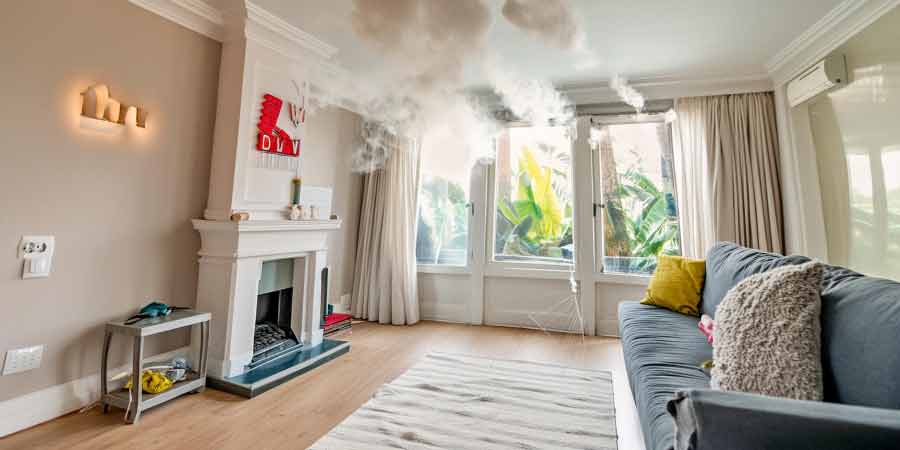
Poor Indoor Air Quality and a Miserable Winter: The Most Common Causes of Wood Burning Fireplace Smoke Filling Your Home
The chimney’s simple yet elegant design allows hot smoke to rise and safely exit your home through the scientific process called convection. The hot air rises while the cold air coming down through the chimney sinks.
The resulting suction effect helps draw in even more cold air and oxygen from outside, which in turn helps your fire burn more efficiently. If there is any disruption to this natural convergence of hot and cool air, the chimney draft cannot draw hot smoke up and out of the chimney.
A wood-burning stove will also have similar draft issues, although it typically does not produce as much smoke as a conventional wood-burning fireplace.
If your living room is smokier than usual after chimney fires are lit, there are common causes Chimney Sweep Professionals can explore, including:
The Fireplace Damper Is Closed or Damaged
Made from cast iron or ceramic, the fireplace damper is essentially a tiny door that allows you to open and close the chimney. When you close the damper completely, smoke from the fire cannot rise out of the chimney and will instead go back into your home.
If the damper is too large or damaged, proper airflow is obstructed, and the smoke cannot travel up and out the chimney top. The easiest way to determine if the damper is the culprit is to open it!
If you are still experiencing the same issue after opening the damper, check to see if the damper is ill-fitting or damaged. In this case, it is best to contact a professional for immediate repairs.
A Blocked or Dirty Chimney Flue Causing Impeding Air Flow
You have a smoke problem and aren’t sure why your chimney isn’t working as efficiently as it should. Obstructions, including animals and debris, and dangerous creosote buildup are two additional common causes.
Pests, including raccoons and even bats, will make themselves at home in your chimney, primarily if you do not have a functional chimney cap. If you hear strange noises or a peculiar odor emanating from the chimney, and you suspect a nuisance animal is to blame, contact a professional for prompt Animal Removal for Chimneys.
A professional can also help you with Secure Chimney Cap Installation, making it difficult for pests to reenter your open chimney.
Creosote is another common cause of fireplace obstructions. When a chimney fire burns, creosote is naturally produced.
This sticky byproduct can quickly accumulate inside the chimney liner. The resulting blockage can inhibit airflow, which is why it is essential creosote is regularly cleared by a professional chimney sweep.
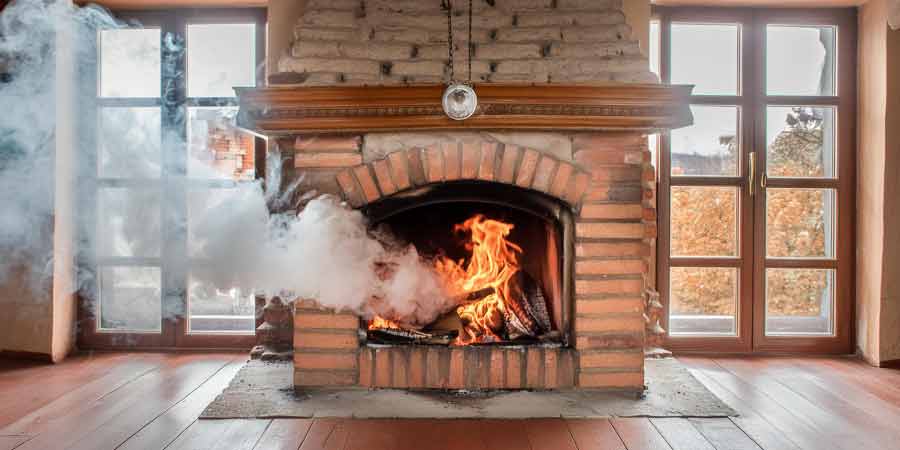
Inferior Quality Firewood: The Dangers of Burning Unseasoned or Wet Wood
Burning unseasoned or damp wood can actually increase smoke production. The fire will struggle to burn efficiently if the wood is wet, resulting in excessive smoke that can easily enter your home.
Always burn seasoned, dry wood and store your wood properly.
Wood should be stored off the ground in a cool, dry place. Cover the wood with a strong tarp or plastic sheeting to adequately protect it from rain, snow, ice, and other moisture. Seasoned wood should have a moisture content no greater than 15%.
Storing wood inside a damp basement is a common mistake. Dry, seasoned wood also lessens the accumulation of creosote inside chimneys, which in turn helps prevent the obstructions that can also create smoke inside your home.
Cold Air Trapped in the Chimney
Cool air and positive air pressure are essential to burning a healthy, robust fire. However, if too much cold air comes into the fireplace from outdoors, which is common during winter, it can disrupt the convection process.
The best way to prevent too much frigid air from entering your home while the fireplace is in use is to install a chimney balloon or weatherstripping around the chimney damper.
Be Wary of Negative Pressure
Your home’s forced air heating system and an exhaust fan in the same room as your fireplace often create a negative pressure vortex that can disrupt the natural flow of warm air up and out of the chimney.
Close any furnace returns/ vents that are close to the fireplace to prevent negative pressure from hampering your chimney’s ability to vent smoke and hot air.
Baby, It’s Warm Outside
The greater the difference between the indoor and outdoor air temperatures, the more effectively your chimney will function. Warmer temperatures outdoors can result in a weak draft.
If it is still frigid outside and you have determined there are no other reasons why your house is filling with smoke, contact us immediately for an Expert Chimney Inspection.
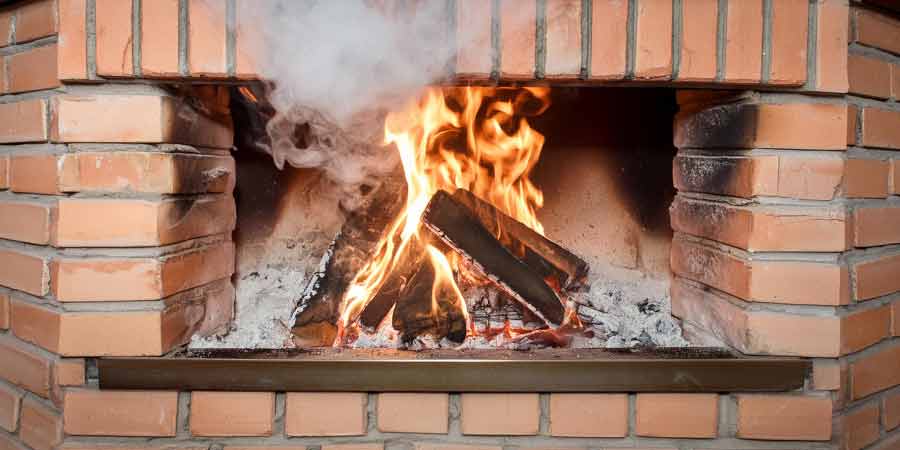
Is Your Fireplace Smoking? Tips to Improve Air Flow and Eliminate Excess Fireplace Smoke ASAP
Nothing compares to cuddling up with a good book beside a roaring fire. Imagine being disrupted when smoke starts filling your living room.
You’ve contacted Fireplace Repair Services, but what do you do in the meantime? Here are a few quick and easy ways to clear smoke out of your home:
- Open the damper
- Open every window and outside door near your fireplace.
- Extinguish the fire ASAP.
- Set up fans to circulate smoke from the house through the open windows.
Simple Ways to Keep Fireplace Smoke Out of Your House
Suppose a smoky fireplace has become a common problem, and you are hesitant to light another fire. In that case, there are things you can do immediately to prevent this common occurrence and start enjoying the benefits of your Denver fireplace.
Perform Regular Chimney Maintenance
As a homeowner, there are several simple steps you can take to maintain your fireplace and chimney, including:
- Clean the firebox with a brush and a shop vac.
- Perform regular visual inspections of the firebox and inner chimney walls. If you notice any damage, seek Professional Chimney Repair immediately.
- Clean the chimney flue and inner chimney walls.
In addition to burning seasoned wood, always allow the fire to burn hot. The more intense the flames, the less creosote will accumulate on the inner walls.
Have Your Chimney Inspected, Maintained, and Thoroughly Cleaned by a Professional Chimney Sweep
Contact the Chimney Kings and schedule a yearly inspection and chimney sweep. Winter is naturally the busy season in the fireplace industry, so your best bet is to work with a chimney professional during the off-season, particularly in the summer when there is more availability.
If the technician notices any damage or obstructions during the inspection, they will discuss the necessary repairs, including Quality Chimney Lining Solutions.
The chimney sweep will eliminate the creosote buildup, which, in addition to lessening your chances of a dangerous house fire, can also help uncover even more problems hiding below the sticky black sludge.
Even if you haven’t used your fireplace in years or only use it intermittently, it is crucial to have a chimney professionally cleaned and inspected at least once a year.
Ensure Your Fire Receives Adequate Oxygen
You need to provide the fire with enough oxygen for it to burn efficiently and ensure positive airflow, which helps draw smoke out of your home through the chimney. When there is not enough oxygen, a fire will smolder, resulting in even more smoke.
The best way to ensure proper oxygenation is to stack wood loosely, double-check that the fireplace damper is open, and burn seasoned wood. If the firebox is damaged, a Firebox Replacement is also necessary to allow oxygen to keep the fire burning efficiently.
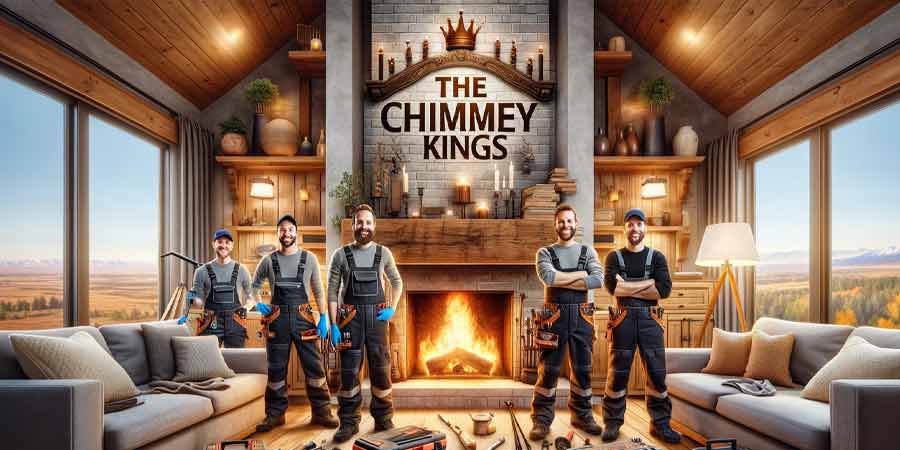
The Chimney Kings: Your Go-To Fireplace Professional
At The Chimney Kings, we are proud to offer high-quality services at a reasonable price. No matter what the issue, if you are having a problem with your chimney or fireplace, we are available to help.
Our goal is simple: To provide affordable Comprehensive Chimney Services to all our Denver Metro Area clients, including:
- Chimney sweeping and inspections
- Durable Chimney Crown and chimney cap installation
- Roof repair
- Firebox repairs
- Brick Tuckpointing Services
- Dryer vent cleaning
Before lighting your first fire of the winter season, contact us to help ensure your fireplace runs efficiently all season long!
Our Customers Ask
Should Smoke Be Coming Out of My Chimney?
Yes, it is absolutely normal for smoke to rise out of your chimney when you are burning wood inside your fireplace or wood-burning stove. Smoke is a natural byproduct of combustion, and if no smoke enters your home and flows up and out the chimney, there is no cause for alarm.
If any smoke enters your home through the fireplace, it is a cause for concern. In addition to creating a foul odor, smoke is a dangerous respiratory irritant that can lead to asthma attacks and bronchitis, particularly in vulnerable individuals.
Why Is My Chimney Smoking Inside My House?
Smoke from your fireplace should never enter your home. If there are any traces of smoke, it is a major cause for concern and requires prompt, professional attention.
The causes of a smoky fireplace are plentiful, and you need the assistance of a professional to help diagnose and fix the issue. The problem might be something as simple as a minor obstruction or more complex, including a collapsed chimney liner or severely damaged chimney cap.


